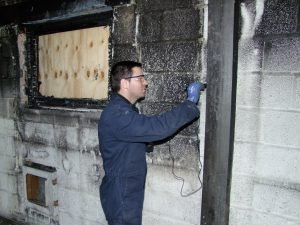R-TECH Materials have recently purchased a state-of-the-art combined portable hardness tester with the ability to measure hardness by ultrasonic contact impedance (UCI) and Leeb. UCI enables the measurement of small products or specific areas of more complex shapes.
Hardness testing can provide a quick and relatively non-invasive measurement of the mechanical properties of a variety of materials. Hardness testing is defined as the resistance to indentation and it is determined by measuring the permanent depth of the indentation. The harder the material, the smaller the indentation will be. This measurement can also be converted to an approximate tensile strength.
Portable hardness testing can be undertaken in-situ (see Figure 1) and is, therefore, a useful tool when components cannot be brought to a traditional tabletop hardness tester. The equipment measures hardness from the rebound of a ball from the test surface. The device is spring-loaded, so that hardness can be measured on surfaces in any orientation. Conversions are available to give results in various hardness scales (Vickers, Rockwell etc).

Figure 1 Portable hardness testing of a structural beam in a fire damaged building
R-Tech Materials use portable hardness testing as part of a condition assessment of various components in process and power plant. For example, hardness testing can provide an indication of loss of strength due to the microstructural changes which occur in carbon steel boiler tubes upon exposure to elevated temperature. This can then form part of a structural integrity assessment to determine the remaining life of a component.
Further, R-TECH Materials are regularly involved with using portable hardness testing for assessing structural steel beams in fire-damaged buildings, a useful tool that many assessors in this industry are not familiar with. Exposure to fire can lead to a significant reduction in tensile strength and therefore render the beams unsafe for continued use. Portable hardness testing can add value to a structural engineering assessment by providing additional information on the level of thermal degradation of the structural steel beams following exposure to the fire. These hardness results can then form part of the assessment which determines whether replacement of the steel beams is necessary, saving time and cost on unnecessary replacement.
For more information on how R-TECH can help you with your in-situ hardness testing requirements please feel free to get in touch: info@r-techmaterials.com